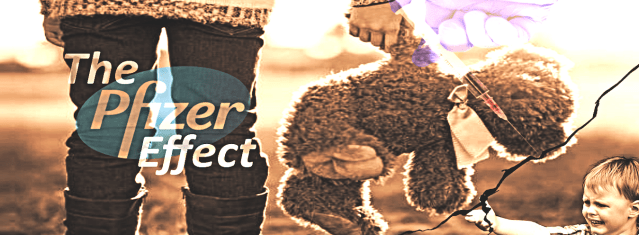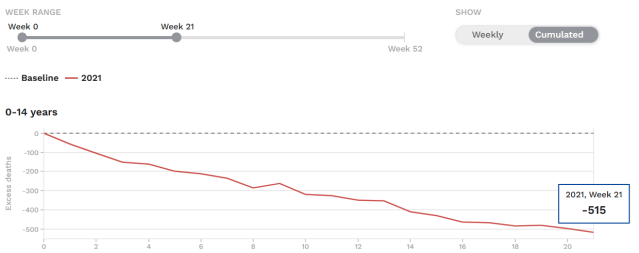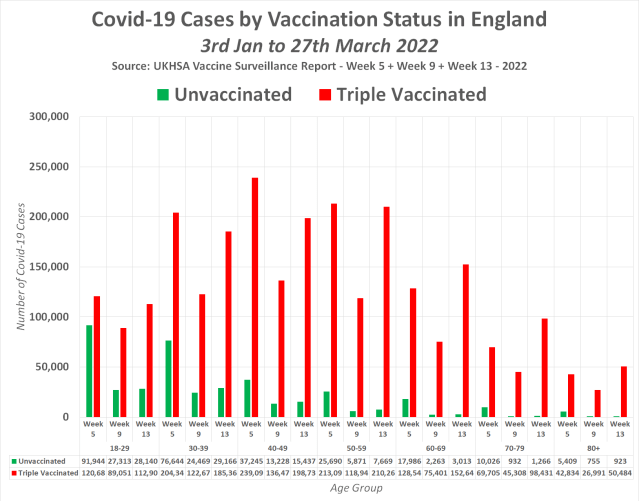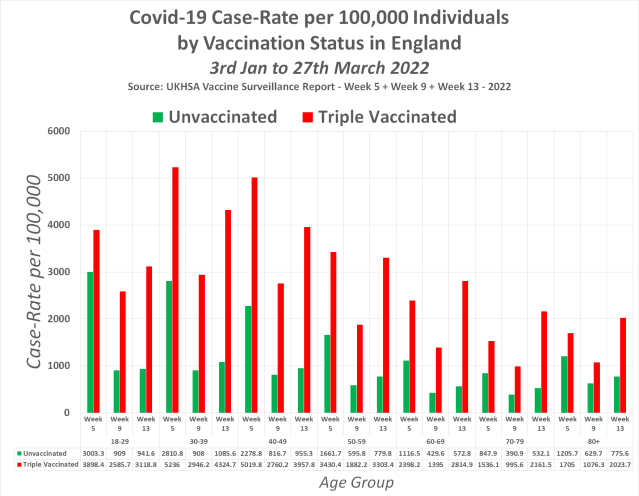42x increase in Excess Deaths among Children in Europe recorded since COVID Jab was “approved” for Children compared to Pre-Jab levels
Excess deaths among children across Europe, excluding Ukraine have increased by 335% since the European Medicines Agency (EMA) granted Emergency Use Authorisation of the Covid vaccines for use in children in week 21 of 2021 compared to the number of excess deaths recorded during the same time frame prior to EMA granting “authorisation” of the Covid vaccine for children.
Let’s not lose touch…Your Government and Big Tech are actively trying to censor the information reported by The Exposé to serve their own needs. Subscribe now to make sure you receive the latest uncensored news in your inbox…
In the scorching summer of 2021, a momentous decision swept across Europe, sparking a whirlwind of emotions among parents, who had fallen for the 24/7 propaganda, eagerly awaiting a ray of hope for their children.
The European Medicines Agency (EMA) had finally granted emergency use approval for the use of the Pfizer COVID-19 vaccine in children aged 12 to 15.
Relief and elation surged through the hearts of countless naive parents who saw this as a beacon of protection against the alleged pandemic.
Yet, the winds of fortune took an unexpected turn as the vaccine rollout for children commenced. Startling reports emerged, revealing a distressing surge in excess deaths among the young ones across the continent. The sense of optimism quickly faded among the thousands of families affected, and was replaced by a grim reality that cast a shadow over the hopes of many.
Tragically, the statistics paint a haunting picture, with a staggering 362% surge in excess deaths among children aged 0 to 14 by the thirty-fourth week of 2024. These numbers whisper a chilling tale of consequences that were foreseen by many silenced and heavily censored voices.

Back in 2020, as the establishment desperately sought to fast track the use of mrna technology disguised as a vaccine against the alleged pandemic, COVID-19 injections were still in the embryonic stages of development, treading a precarious path toward regulatory approval.
To hasten their availability, regulatory agencies like the European Medicines Agency (EMA) and the U.S. Food and Drug Administration (FDA) invoked emergency use authorizations (EUAs), granting a temporary lifeline to these novel and dangerous vaccines.
These EUAs acted as regulatory mechanisms, permitting the usage of medical products in dire circumstances, such as a pandemic, even before they completed the rigorous journey of full regulatory approval.
It was an unprecedented measure taken in the face of an unprecedented crisis. But the alleged Covid-19 pandemic had proven to not be a threat to children, making future decisions by these regulatory bodies extremely questionable and possibly criminal.
One crucial reason why mRNA vaccines had not been widely employed in the general population until December 2020 was the specter of Antibody-Dependent Enhancement (ADE).
This phenomenon haunted the corridors of scientific discourse, raising concerns that vaccination with mRNA vaccines could potentially exacerbate the disease, rendering those inoculated more susceptible to its clutches.
History had already witnessed a chilling episode of ADE during the development of a dengue fever vaccine. Initial trials indicated promise, displaying protection against the virus for those unscathed by prior infections.
Sadly, in individuals who had encountered a different strain of the virus before, the vaccine seemed to amplify the risk of severe illness, a grim testament to the treacherous nature of ADE.
Similar tales emerged from numerous animal studies, where potential “vaccines” instigated lung inflammation and other adverse effects upon subsequent exposure to the virus. The vaccine-induced immune response, rather than neutralizing the virus, wrought havoc on lung tissue, leaving a trail of unintended consequences.
Additionally, the ominous specter of Vaccine-Associated Enhanced Disease (VAED) loomed large during respiratory virus vaccine trials, including those against coronaviruses.
For instance, trials for a respiratory syncytial virus (RSV) vaccine illuminated a disconcerting pattern: vaccinated infants faced an increased risk of hospitalization and more severe respiratory illness upon encountering the virus.
The immune response triggered by the vaccine, rather than safeguarding against the virus, seemed to trigger an overreaction of the immune system, exacerbating the disease’s symptoms.
Respiratory viruses, such as coronaviruses and RSV, had long been recognized as grave threats to vulnerable populations, especially infants and the elderly.
However, the alleged SARS-CoV-2 virus, supposedly responsible for the COVID-19 pandemic, appeared to spare the younger generation, raising perplexing questions about the extension of Emergency Use Authorization (EUA) for Covid-19 vaccinations to children.
The absence of an imminent threat to children further muddled the decision-making process.
The ultimate goal couldn’t have been containment, as real-world data revealed an ironic twist: the Covid-19 vaccinated population seemed to exhibit a higher likelihood of infection and transmission compared to their unvaccinated counterparts. The very shield intended to protect against the virus appeared to falter in its mission.
The eye-opening chart, encompassing the period from January 3rd to March 27th, 2022, unveiled the total number of Covid-19 cases categorized by vaccination status and age group in England. The data, extracted from the the UK Health Security Agency (UKHSA) Week 5, (page 43), Week 9 (page 41) and Week 13 (page 41) Covid-19 Vaccine Surveillance reports , painted a vivid picture of the disconcerting reality.
Similarly, another revealing chart illuminated the case rates per 100,000 people, again segregated by vaccination status and age group in England. The alarming disparity emerged: case rates soared among the triple-vaccinated population in every age group, leaving a gaping chasm between them and the unvaccinated.
The divide only grew wider as time passed.
The numbers spoke volumes, revealing that the Covid-19 vaccine recipients faced a higher risk of infection compared to the unvaccinated populace. The evidence begged for a closer examination.
But that examination has still not happened, and sadly, in a recent analysis, EuroMOMO, an organization entrusted with official statistical data from European countries, published data that revealed a disheartening correlation between the approval of the Pfizer COVID-19 vaccine for children and a surge in excess deaths among the young ones.
The data, collected from 26 participating countries across Europe (not including Ukraine) paints a grim picture that simply cannot be ignored.
The chilling figures, extending up to the 34th week of 2024, will most definitely capture the attention of concerned minds.
It is also worth noting that the data only covers 26 out of the 44 countries in Europe, excluding Ukraine. Meaning any claims attributing the findings to the ongoing war can be dismissed immediately.
During week 21 of 2021, the European Medicines Agency extended the emergency use authorization of the Pfizer COVID-19 vaccine, first to children aged 12 to 15 and later to the age group of 5 to 11.
However, the weeks following the approval witnessed a shocking rise in excess deaths among children, an upward trend that persisted unabated.
Between week 21 of 2021 and week 52 of 2021, an alarming tally of 310 excess deaths among 0 to 14-year-old children should have sent shockwaves through the continent. But the data was suppressed.
The contrast couldn’t have been starker, as the period between week 1 and week 21 of 2021 saw 515 fewer deaths than expected.
And the fact the surge in excess deaths aligns perfectly with the EMA’s approval of the Pfizer COVID-19 vaccine for children aged 12 to 15 cannot be merely dismissed as coincidence.
The distressing trend continued throughout 2022, with a total of 1,639 excess deaths among children aged 0 to 14 across the 26 European countries, painting a grim reality that cannot be dismissed.
Thankfully, 2023 was slightly better with 138 excess deaths recorded among children.
But sadly, we have again seen a huge increase in 2024 with 442 excess deaths recorded among children across Europe as of week 34 of 2024.
The somber figures speak of an unprecedented 335%/42x surge in excess deaths since the European Medicines Agency extended emergency use authorization of the Covid-19 vaccine to children aged 12 to 15.
The contrast with the previous period couldn’t be starker.
From week 44 of 2018 to week 21 of 2021, 735 fewer deaths occurred among children aged 0 to 14 than expected.

Source
The staggering increase in excess deaths among children aged 0 to 14 across 26 European countries, including the UK, France, Spain, Italy, and Germany, paints a bleak picture of an astounding 335% surge since the European Medicines Agency extended emergency use authorization of the Pfizer COVID-19 vaccine to children aged 12 to 15.
This distressing reality raises serious concerns, considering the experimental nature of the injections and its previous avoidance due to the risks of antibody-dependent enhancement (ADE) and Vaccine-Associated Enhanced Disease (VAED).
Moreover, administering the vaccine to children, who were not at significant risk from the alleged Covid-19 virus, seems perplexing in light of the 873 fewer deaths recorded among children aged 0 to 14 across Europe in 2020, from the onset of the alleged pandemic to the year’s end.





